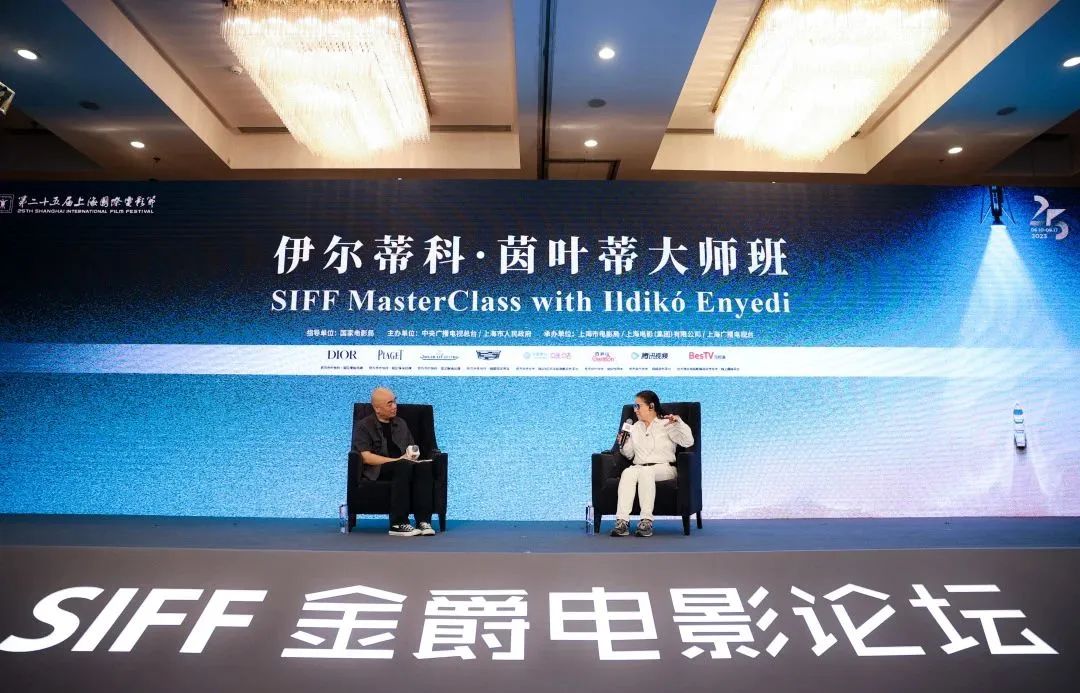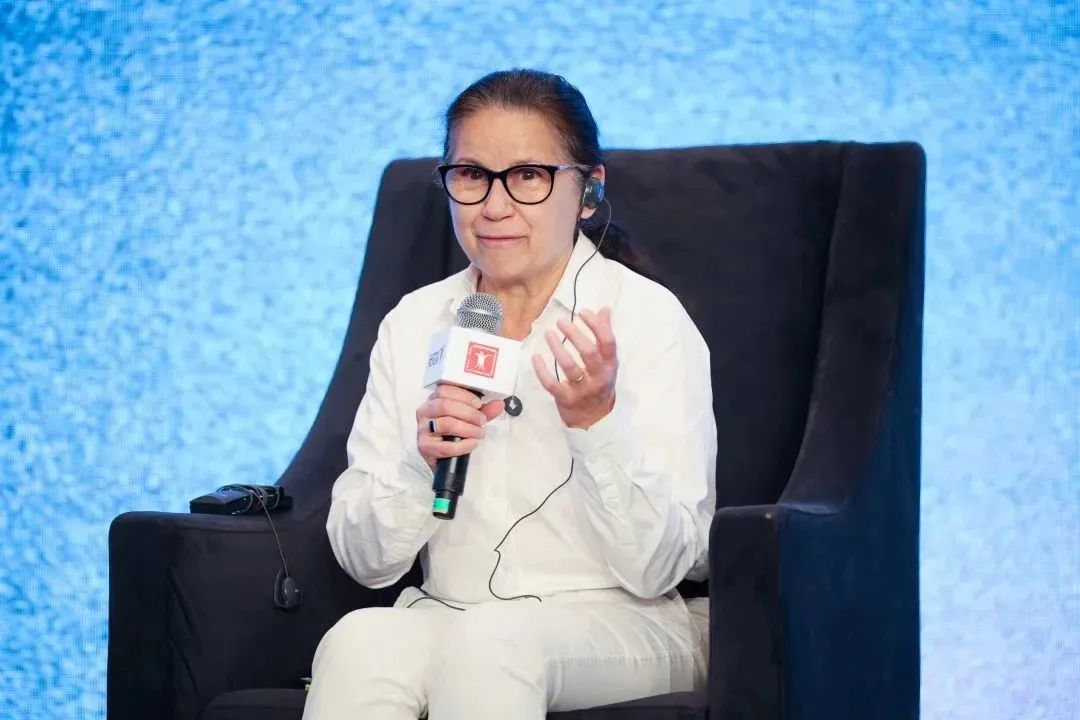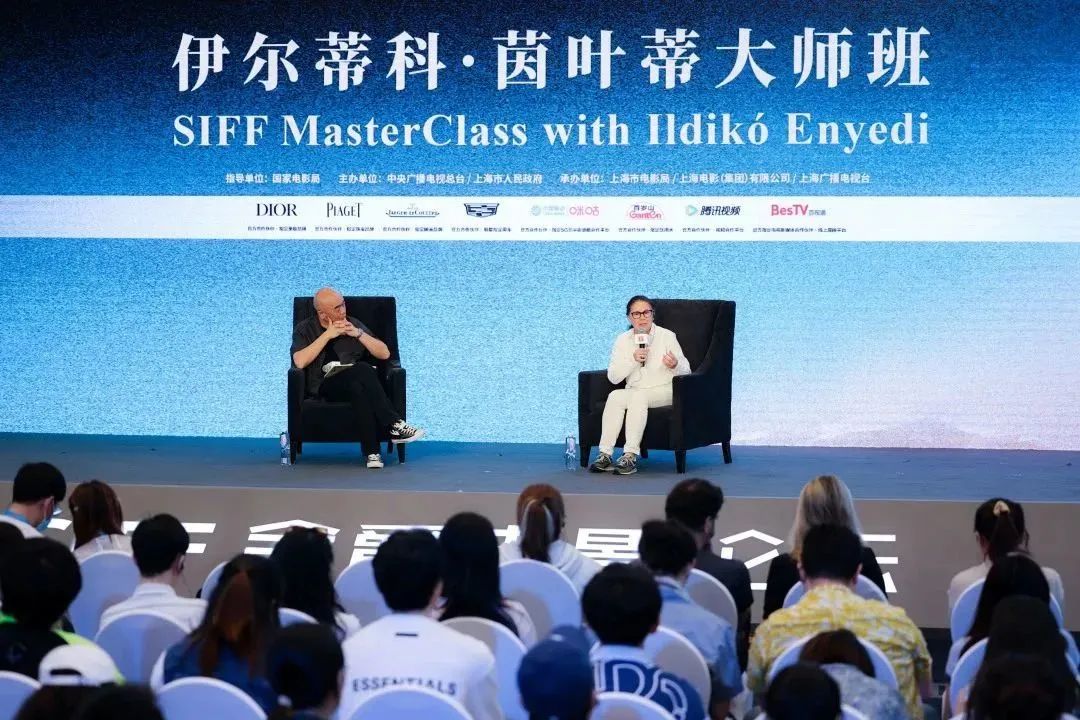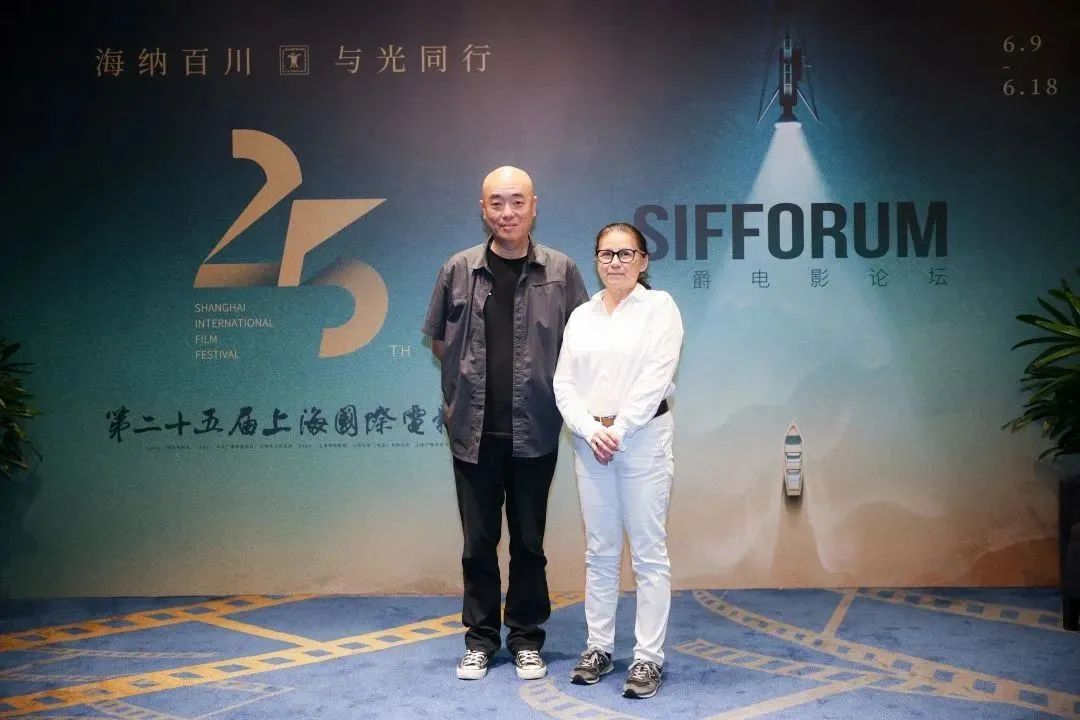SIFF MasterClass|Ildikó Enyedi: Filmmaking Is a Desperate Cry, Hoping to be Heard by Others
Hungarian director and screenwriter Ildikó Enyedi graced the 25th Shanghai International Film Festival (SIFF) as a guest of the SIFF MasterClass on June 13. The event was specially hosted by director Zheng Dasheng.
Enyedi is one of Hungary's most renowned film directors. In 2017, her self-written and directed film ON BODY AND SOUL won the Golden Bear at the 67th Berlin International Film Festival and was nominated for the 90th Academy Award for Best Foreign Language Film. In 2020, her self-written and directed drama THE STORY OF MY WIFE was selected for the main competition at the 74th Cannes Film Festival. Enyedi has served as a jury member at multiple international film festivals. In 2018, she was invited to be a jury member in the main competition for the Golden Goblet Awards at SIFF. In 2021, she served as a member of the international jury at the 71st Berlin International Film Festival. This year, she is the President of the Short Film Jury of Cannes Film Festival.
At the SIFF MasterClass session, Enyedi was asked how to navigate the relationship between art and market, personal expression and commercial operations. “As a filmmaker, when shooting a film and presenting it to the audience, it is essentially a sole desperate cry, hoping to be heard by others,” she said. Thus, if a director firmly believes in using film for self-expression, they must express themselves wholeheartedly to ensure it can be understood and appreciated by an audience.

【Expression】
“Dismiss the fear that your expressions may fall upon indifferent ears”.

Enyedi entered the film industry in 1979, directing her first short film. In 1989, her self-written and directed debut feature film, MY 20TH CENTURY, won the Golden Camera Award at the 42nd Cannes Film Festival, and was selected as one of the 12 best films in Hungarian film history.
Speaking on the creative inspiration behind MY 20TH CENTURY, Enyedi explained that her process does not necessarily start with a story. On the contrary, a complete narrative often takes shape for her at the end of the film or towards the conclusion of shooting. Her inspirations stem from “many urgent and complex questions” that occupy her mind. For instance, while shooting MY 20TH CENTURY, she wanted to explore, as a young filmmaker, many questions revolving around art, the human condition, and human history that were prevalent in her mind. She sought stories beginning with these queries, absorbing them like a sponge, and then presenting them to audiences through her films. Some of her works draw inspiration from music, such as SIMON, THE MAGICIAN, which incorporates many elements of a musical.
Like the young Enyedi, many young directors today possess a strong desire for self-expression. But what if the audience does not respond? Should the needs of the market and the audience be included in a director's considerations? Enyedi candidly said that this isn't an easy issue to balance, and she doesn't advise young people to seek such equilibrium. “You must express yourself well, ensuring good use of the medium of film to communicate your message,”she said. “But one should dismiss the fear that your expressions may fall upon indifferent ears. Believe in your conviction; otherwise, no one will be convinced by your work, because you can't even convince yourself.”
Enyedi admitted to being “tortured” during the shooting of MY 20TH CENTURY, but she never doubted her capability to complete it. Of course, “not pleasing others” does not mean complete self-indulgence, she said. It is necessary for a director to articulate every “point” in the film, convey their beliefs sincerely through it, and then wait for the audience to receive these messages.
【Teamwork】
“Bring everyone together to ensure consistency”

Starting from her entry into the industry with short films, Enyedi's works have exuded a rich poetic quality, and her treatment of light and composition markedly differs from other directors. This was an issue of particular interest to the host, director Zheng Dasheng: how to persistently maintain such a strong personal style?
Enyedi explained that from the outset of her first feature film, she has sought to collaborate with a “styleless” cinematographer. By “styleless”she means someone who is focused on shooting techniques, and willing to find an appropriate presentation style with the director, rather than overly emphasizing their own self-expression. In Enyedi's view, each film project should first ensure consistency and continuity. “The most important thing, including our producers, collaborators, even drivers, is to bring them all together to ensure consistency,” she said. With consistency as the main premise, there is room for flexibility.
Enyedi was emphatic in saying that she is not a “dictatorial” director. For instance, while she asks the cinematographer to enter her realm, she also tentatively steps into theirs. The same cinematographer lensed Enyedi's first three feature films. Later, when she began teaching at the Hungarian Film Academy, this cinematographer became her academic collaborator. Thanks to this working attitude, Enyedi has maintained a relatively stable team, including cinematographers, editors, and art directors, with whom she has collaborated multiple times. She humorously noted that she doesn't particularly appreciate overbearing collaborators. Instead, she prefers to work closely with her partners, maintaining mutual respect.
A potent and enduring personal style also stems from Enyedi's steadfast commitment to directorial control when dealing with financial backers. When asked about dealing with commercial interference and financiers’ involvement in the production team, Enyedi said that with each project she takes on, she insists on having absolute control over casting, editing, and framing; otherwise, she would prefer to reject the project. Of course, she is also concerned with the film production budget and strives not to exceed it, so as not to put the producers in a difficult position. “I am responsible and serious because I am extremely grateful that they let me direct and give me the power of control. However, within the budget, everything is decided by me,”she said.
【Actors】
“(They) should maintain a sense of authenticity and refrain from over-acting”

The ability to foster such team collaboration is also evident in her work with actors. Enyedi considers actors as partners and tries to understand their specific working methods, identify their comfort zones, and see if there is the potential to “further open up” on the set, presenting something unique. “The director is not a superior patriarch, not a magician, and won't wave a wand to make them obedient like children,”she said.
One of Enyedi's most familiar works to the Chinese audience is ON BODY AND SOUL from 2017. The story unfolds in a slaughterhouse where the finance director, Endre, is a man with a peculiar personality and a disabled left arm. Surprisingly, the newly arrived quality inspector, Mária, is an introverted girl, and the two share the same dream each night. The film breaks the cliché of love at first sight, presenting an awkward and absurd love story between two odd characters.
Enyedi made special mention of the lead actors in ON BODY AND SOUL, saying they were exceptional. The actor who played Endre is actually the director of a publishing company in Hungary, having never acted in films before. He was initially involved in the casting process with the team and serendipitously ended up as the male lead. The role required a powerful screen presence, and Enyedi hoped to elicit this. To her delight, the newly cast actor cleverly understood and fulfilled the director's intentions.
The actress who portrayed Mária was an accomplished stage actress, and ON BODY AND SOUL marked her first leading role on the big screen. Enyedi humorously remarked that the actress herself was very assertive and decisive, always elegantly dressed when they met, quite unlike the shy Maria from the film. Therefore, the director's job was to guide the actress to find Maria within herself. Enyedi made many attempts, even gifting the actress a pair of training shoes with a slight heel, causing her to walk with a bit of awkwardness, precisely the trait needed for the role of Maria. This strategy helped the actress gradually come closer to Maria's character. With the lead actors' understanding and proximity to their respective roles, filming was “silky smooth,”she said. This aligns with Enyedi's crucial demand of her actors: that every character presented on the big screen “should maintain a sense of authenticity and refrain from over-acting.”







